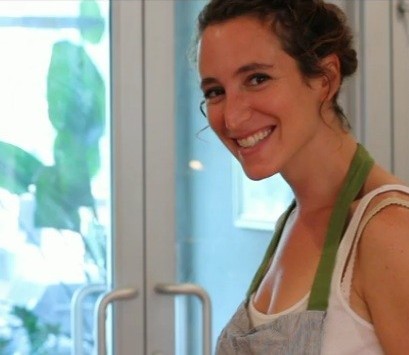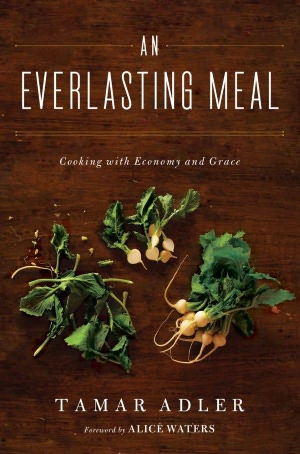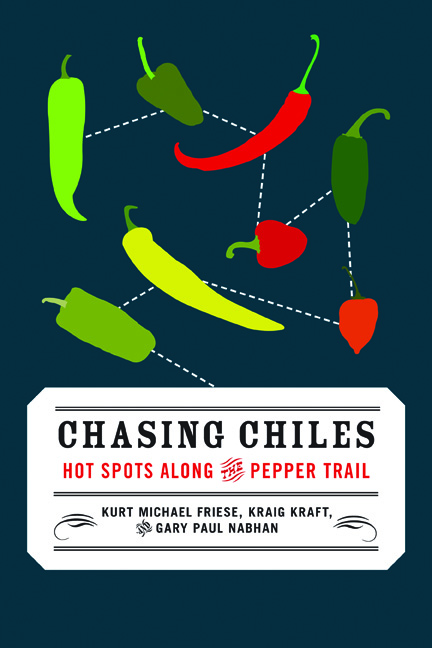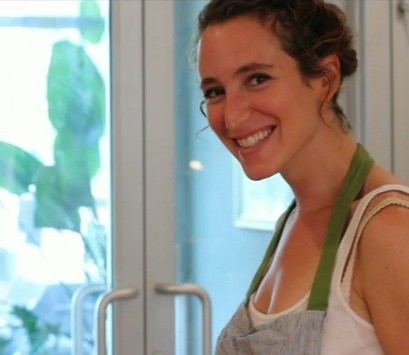 Photo from the video Tamar Adler Talks About An Everlasting Meal.Editor’s note: It’s unanimous these days: Cooking food from scratch at home is one of the best ways to eat sustainably without breaking the bank. It also enables eaters to easily support food producers who use environmentally sound, ethical, and humane practices. But most Americans can’t pull this off regularly. We recently invited Kurt Michael Friese and Tamar Adler — two people who have strong feelings about the importance of home cooking — to have a conversation for Grist. Adler is a chef, cooking teacher, and the author of the new book An Everlasting Meal: Cooking with Economy and Grace; Friese is a chef, the editor of Edible Iowa River Valley, and the author of two books, including A Cook’s Journey: Slow Food in the Heartland and Chasing Chiles: Hot Spots on the Chile Trail (which he co-authored with Gary Nabhan and Kraig Kraft).
Photo from the video Tamar Adler Talks About An Everlasting Meal.Editor’s note: It’s unanimous these days: Cooking food from scratch at home is one of the best ways to eat sustainably without breaking the bank. It also enables eaters to easily support food producers who use environmentally sound, ethical, and humane practices. But most Americans can’t pull this off regularly. We recently invited Kurt Michael Friese and Tamar Adler — two people who have strong feelings about the importance of home cooking — to have a conversation for Grist. Adler is a chef, cooking teacher, and the author of the new book An Everlasting Meal: Cooking with Economy and Grace; Friese is a chef, the editor of Edible Iowa River Valley, and the author of two books, including A Cook’s Journey: Slow Food in the Heartland and Chasing Chiles: Hot Spots on the Chile Trail (which he co-authored with Gary Nabhan and Kraig Kraft).
Kurt Michael Friese: I think Americans have been sold a bill of goods: I think they’ve been coerced into believing that cooking is a chore akin to washing windows, something to be avoided if possible and then done as quickly and grudgingly as they can manage. Too many people believe they don’t have the time. That’s the most common excuse anyway. And of course they do — it’s all a matter of priorities.
Tamar Adler: My sense is that there are three variables. A study that came out earlier this year found that 28 percent of Americans stayed out of their kitchens because they were scared they didn’t know how to cook. The other two variables are obviously time and money. The same study found that one-third of Americans spent more time thinking about what to cook than actually cooking. In other words, we have a very skewed relationship to the act of cooking.
The thing about priorities is that if we don’t know what cooking actually means — that is, the kind of cooking that makes deep sense in our lives — then of course we don’t have time, or money.
It takes a very long time to cook in a way that isn’t sustainable, and it’s very expensive. And it makes sense to feel bullied by being told to make something that takes a long time and costs a lot of money a priority. But of course, that’s not what we’re saying. It just takes a lot of explaining and careful guidance to show the whole picture of cooking, and how much it can give you, if you do it with a certain mindset.
Kurt: I have long said that I may be a part of the last generation to have learned to cook at his mother and grandmother’s apron strings. And if people are no longer learning to cook from their parents (because their parents didn’t learn either), then we need to find some new ways to teach them. One thing I’ve called for is something I call The Public Hearth.
Tamar: That sounds wonderful.
Kurt: What did you want to achieve with your book? The first thing that pops into my head when I’m asked about why I write about food is MFK Fisher’s response to the same question: “There is a communion of more than our bodies when bread is broken and wine is drunk, and that is what I say when people ask me, ‘Why do you write of food, and not of love or war?'”
 Tamar: I have two answers. One is also MFK Fisher’s, which I’ll paraphrase: People who live to eat are not so much bad as boring, and in fact she says she knew only two such sorry souls. I know a few, and it’s true I don’t mind them so much as pity them. But she knew a good many people, as do I, who would be better for considering their appetites seriously, and not obsessively, but as we allow ourselves to consider our sleep, and caring for our children, and enjoying sunny days. Because our appetites our unique to us, and considering them makes us more responsible and happier, healthier beings.
Tamar: I have two answers. One is also MFK Fisher’s, which I’ll paraphrase: People who live to eat are not so much bad as boring, and in fact she says she knew only two such sorry souls. I know a few, and it’s true I don’t mind them so much as pity them. But she knew a good many people, as do I, who would be better for considering their appetites seriously, and not obsessively, but as we allow ourselves to consider our sleep, and caring for our children, and enjoying sunny days. Because our appetites our unique to us, and considering them makes us more responsible and happier, healthier beings.
The second answer is mine, and it is that the means of producing our food has been meanly wrested from our hands, and we need it back. It sounds like a great communist exercise when I put it like that, but it’s fundamental to our sovereignty to have the means to feed ourselves.
Kurt: Very true. And what I spend a lot of time pointing out to people is that cooking is the simplest, purest, most tangible way we can convey our love for our family and friends. What we feed our children is both metaphorically and literally what they become. That’s what I mean by priorities.
So I try to teach people the real basics of cooking. How to make a stock, the difference between braising and roasting, how to break down a chicken, etc. General knife skills, too — nothing is a greater time-saver for the home cook than strong knife skills.
Tamar: I want to get away from admonishing people that their priorities are wrong. The great, lucky thing is that when you know how to throw your scraps into a pot to make stock — then how when you have stock, all you have to do is poach an egg in it and toast some stale bread — feeding people well is freeing.
I wrote my book to be on the side of everyone who’s scared, and everyone who wants to prioritize cooking, but can’t see how to — for whom it’s a priority they feel they have to trade off because they’re not skilled enough.
They have [so few] advocates now. You are one, and Samin Nosrat is one, and I’m trying to be one. Michael Pollan in his next book is going to be one, and we have to keep it up.
Kurt: And it’s the same entities scaring them from cooking as feeding them the stuff that confuses what’s healthful and not.
Tamar: Yes. I had a few great conversations with trendologists when I was writing my New York Times op-ed on the value of a grandmotherly perspective on cooking — like the one we have on Thanksgiving — and both said that food companies were trying to get people not to cook.
And because [companies like] Kraft or Velveeta, with their Cheesy Skillets, and organic premade burritos, etc., cater to a lot of the trends — i.e. people wanting to feed their families organic food, and artisanal food — what those really things mean, and how easy and affordable it can be to engage them, gets obscured.
 Kurt: You would not believe the number of calls we receive at my restaurant every year asking if we are open on Thanksgiving. I suppose I should be honored that they’d want me to cook this important meal for them, but it makes me sad that they can’t or won’t do it themselves.
Kurt: You would not believe the number of calls we receive at my restaurant every year asking if we are open on Thanksgiving. I suppose I should be honored that they’d want me to cook this important meal for them, but it makes me sad that they can’t or won’t do it themselves.
Tamar: Maybe we should touch on the idea of the professionalization of cooking. We think we’re supposed to be chefs. We idolize chefs, we think we’re supposed to be able to cook like them. We go to restaurants and imagine that what we get is cooking. And that the alternative is premade.
Kurt: There has been a move over the last two decades to make chefs into rock stars, and while I wanted to be a rock star when I was 15, I no longer do. I like that the attention is beginning to shift toward the farmer, who after all is doing most of the hard work. We chefs too often are, in Tony Bourdain’s parlance, “People who swan around in white coats and take credit for other people’s toil.”
The most obvious thing people could learn from the pros, though, is mise en place.
Tamar: I am, again here, a little contrarian. Chefs are amazing, but a lot of what they do is organizational, and about the incredible difficulties in staying inspired while running a volatile organization — dealing with a million moving pieces and people with different needs, and equipment that breaks down.
Home cooks need to learn from skilled, grounded home cooks. They can learn mise en place, but they get that from the Food Network. What they don’t get from the Food Network, or from the lionizing of the restaurant or from many food magazines is [suggestions like] save onion skins, or make frittatas from anything. I think that’s what grandmothers used to teach.
Kurt: As my mother told me back in the ’80s, “quiche was not developed as a test of masculinity, it was developed to get rid of leftovers.” I worry about what people learn from TV because it’s too much like porn: People who are prettier and more talented than you doing things you’ll never do in places you’ll never do them. It stresses people out to think that they need to live up to that standard.
Tamar: Exactly. Two days ago I did a shoot for Martha Stewart Everyday Food, and the editor-in-chief stopped the art director from putting things in little perfect bowls because she didn’t want to make it aspirational. She wanted it to be approachable for home cooks, which made me really happy.
This brings us to the difference between having an intimate knowledge of food versus fetishizing it.
Kurt: Yes. Is there a more fetishized food than bacon?
Tamar: Bacon is a great example. Bacon is a sort of magic food, a little like olives, or anchovies, in that if you have a little, anything else you have seems special. If you have a tiny bit of bacon around, simple pasta with butter and cheese becomes a wonderful version of carbonara. Or an egg, fried in [bacon] fat, seems rustic and hardy. If you have olives, you can make olive paste, which disguises the fact that other than that you only have toast. A couple of anchovies transform anything, from pasta, to salad, to stale bread. But I didn’t feel able, in my book, to say that bacon was magical for all those reasons, because instead of understanding bacon as deeply economical, and all it takes to transform a staple into a great, rustic meal, we [now] understand it as something that needs to go into bourbon and chocolate. Even into peanut butter! We manage to pervert the most useful things, and in so doing, lose the ability to really marshal them.
Kurt: The same thing happened to skirt steak.
Tamar: We need to rebind cooking to the sort of simple love we have for our pets and children, unbind it from passion and rebind it to tenderness.
Kurt: That’s an excellent point. But I also believe traceability is vital — knowing the source of your food and shaking the hand that raised it when possible. Also understanding the importance of biodiversity — becoming aware that there is more than one kind of squash, or apple, or pig, and that we need there to be more than one kind. It also helps to learn about food from as many different cultures as possible. Eating their food with them is far better than “walking a mile in their shoes” to get to know that culture.
Tamar: And part of it being important to you is knowing that it can be important without being everything. It can matter, but not matter to the exclusion of all else. In order for that to be true, we need to know how to cook, and the kinds of cooking that are not time-intensive and denatured — like the stuff on Top Chef or Iron Chef — but the quiche which uses leftovers.
Kurt: Where do you think class comes into it?
How do we get the single mom in a trailer with four kids to read [your] book? Or at least to understand its ideas?
Tamar: That’s what I wanted my book to do. We need to keep our message focused on cooking, and on the sort of cooking that’s economical. We need skills classes to be affordable. [I want] to get a grant to get my book handed out at community centers, and get FoodCorps to teach how to make pasta with eggs, and make good soup from a can of chickpeas. We need to make cooking into the second part of food justice, and food sovereignty, and talk about feedings ourselves as something we deserve to be able to do.
Kurt: Indeed. It’s even patriotic!
Tamar: Yes, it is patriotic. I really wanted Sam Kass and Michelle Obama to read the book, because I want to get the message to people who need it.



